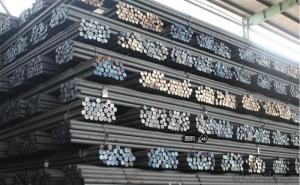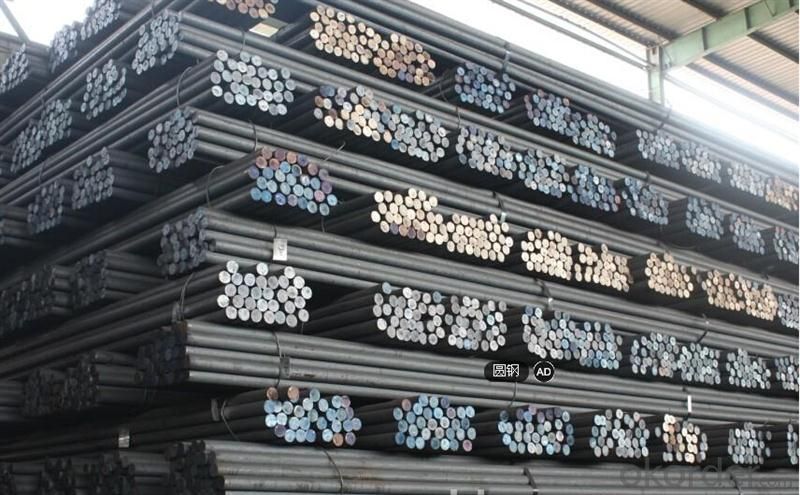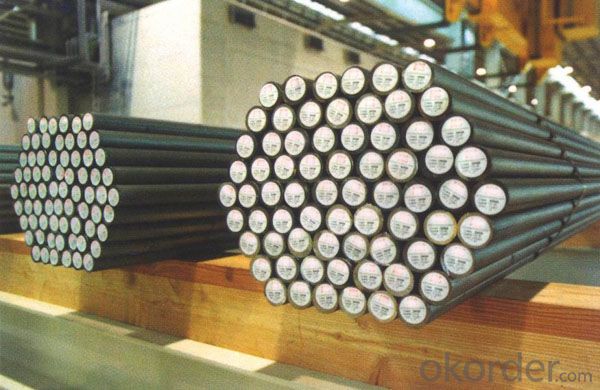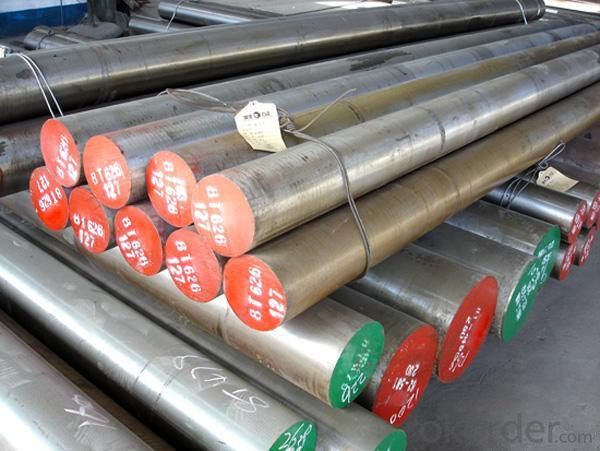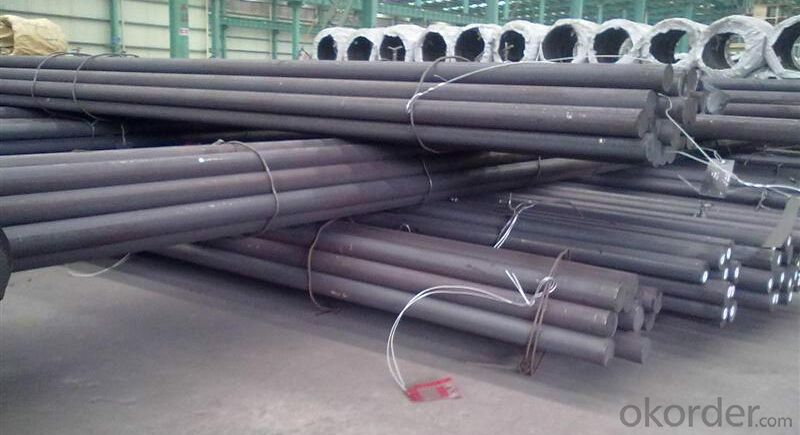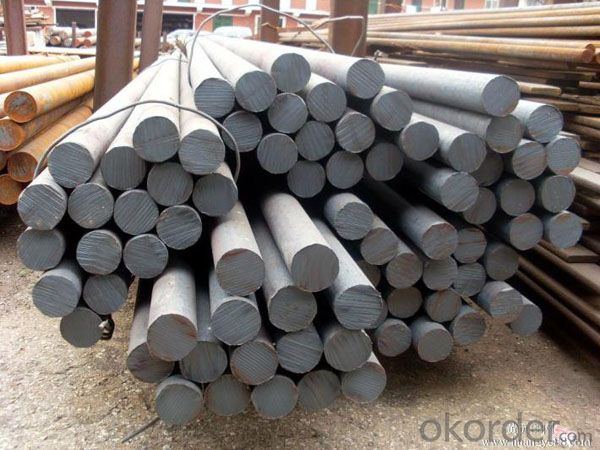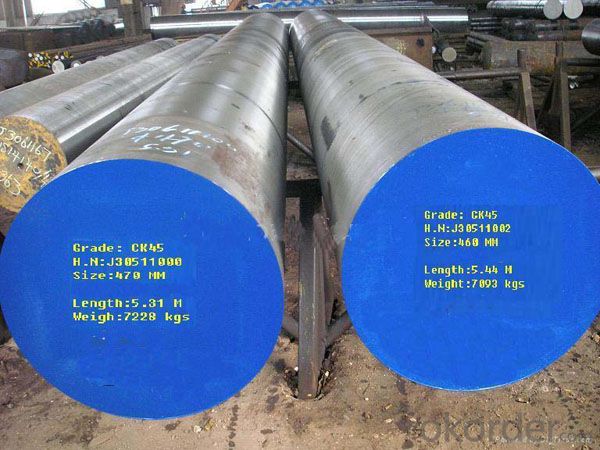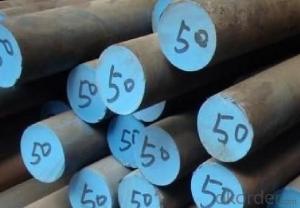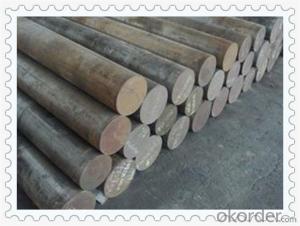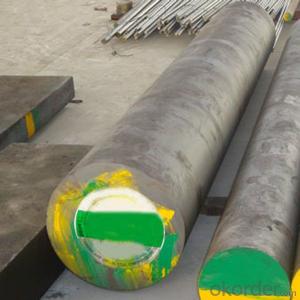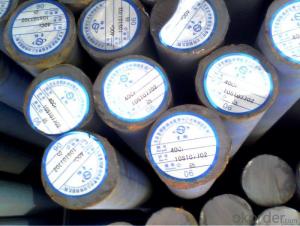Grade SCM440 Forged Alloy Steel Round Bar
- Loading Port:
- Shanghai
- Payment Terms:
- TT OR LC
- Min Order Qty:
- 3 m.t.
- Supply Capability:
- 100000 m.t./month
OKorder Service Pledge
OKorder Financial Service
You Might Also Like
Specification
Grade SCM440 Forged Alloy Steel Round Bar
Details Information of Grade SCM440 Forged Alloy Steel Round Bar
| Name | SCM440 Carbon Steel Round Bar |
| Shape | Round Bar/Square Bar/Flat Bar/Plate/Wire |
| Standard | GB/ASTM/SAE/AISI/DIN/JIS/EN/BS |
| Surface Treatment: | Black/Peeling/Polished/Machined |
| Delivery Condition: | Hot Rolled or Forged/Peeled or Black Surface |
| Test | SGS/UT 100% Elements Testing |
| Certificate: | ISO/Mill Certificate |
| Service: | 24 hours online service / |
| more than 20 years trading and manufacture | |
| Quality Assurance: | the third party inspection, such as SGS, BV, TUV…etc. is acceptable |
| Packaging Details: | Seaworthy Packaging or as per customer's packing instruction |
| Carbon structure round bar | Q195 Q235A Q235B 10# 20#-55# S45CB |
| Low alloy high strength round bar | Q345A/Q345C/Q345D Q345B Q345E |
| Alloy structure round bar | SAE51B20 20Cr 40Cr 40CrV 20CrMo/30CrMo/35CrMo/42CrMo 20CrMoA/30CrMoA/35CrMoA/42CrMoA/42Cr ML20CrMo/ML30CrMo/ML35CrMo/ML42CrMo B7/SCM435-440 20MnTiB 20CrMnMo 20CrMoH 42CrMoH 40MnB/40MnBH 30Mn2-40Mn2 27SiMn 50CrVA 30CrMnTi |
| Pinion steel | 20CrMnTi 20CrMnTiH 20CrMnTiHCS/20CrMnTiHLD Q20CrMnTi-1/Q20CrMnTi-2 |
| Sucker rod | 20-35CrMoA |
| Free-cutting steel | GT1215S |
| Spring steel | 60Si2MnA 65Mn |
| Ball bearing steel | GCr15 |
Chemical Composition of Grade SCM440 Forged Alloy Steel Round Bar
| C | Si | Mn | P | S | Cr | Ni | Cu |
| 0.17-0.24 | 0.17-0.37 | 0.35-0.65 | ≤0.035 | ≤0.035 | ≤0.25 | ≤0.25 | ≤0.25 |
| Tensile strength (σb/MPa) | Yield strength (σb/MPa) | Elongation (δ5/%) |
| ≥410(42) | ≥245(25) | ≥25 |
Company Introduction of Grade SCM440 Forged Alloy Steel Round Bar
CNBM International Corporation is the most import and export platform of CNBM group(China National Building Material Group Corporation) ,which is a state-owned enterprise, ranked in 270th of Fortune Global 500 in 2015.
With its advantages, CNBM International are mainly concentrate on Cement, Glass, Iron and Steel, Ceramics industries and devotes herself for supplying high quality series of refractories as well as technical consultancies and logistics solution.
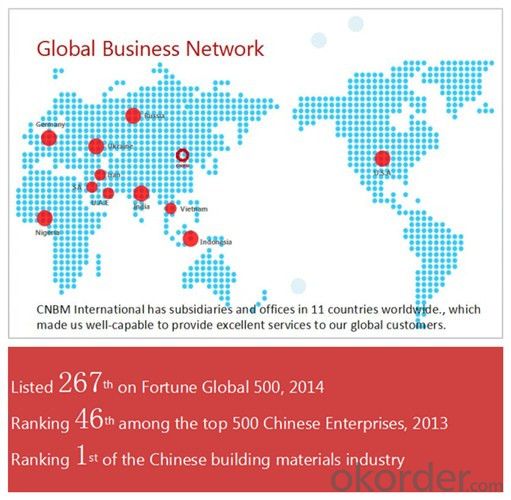
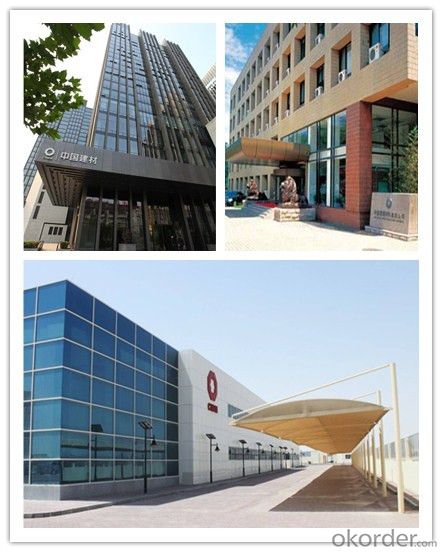
Certificates of Grade SCM440 Forged Alloy Steel Round Bar
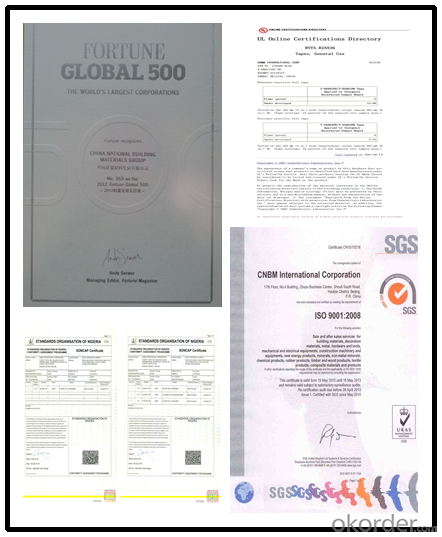
Packaging & Delivery of Grade SCM440 Forged Alloy Steel Round Bar
Packaging Detail | Sea worthy packing /as per customer's packing instruction |
Delivery Detail | 15 ~ 40 days after receiving the deposit |
Products show of Grade SCM440 Forged Alloy Steel Round Bar
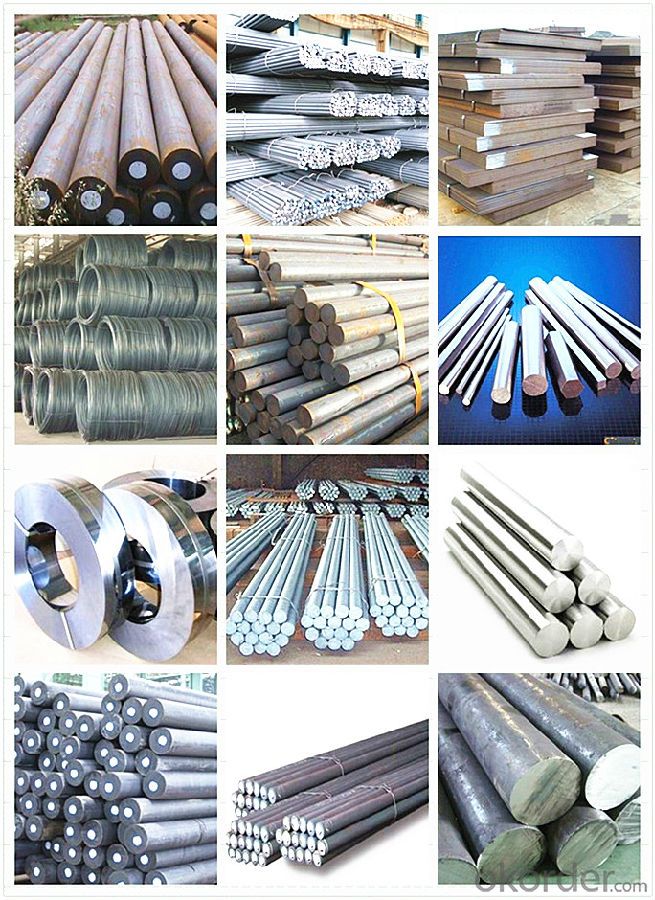
FAQ
Are you a trading company or manufacturer? | Manufacturer |
What’s the MOQ? | 3 metric ton |
What’s your delivery time? | 15-35 days after downpayment received |
Do you Accept OEM service? | Yes |
what’s your delivery terms? | FOB/CFR/CIF |
What's the Payment Terms? | 30% as deposit,70% before shipment by T/T |
Western Union acceptable for small amount. | |
L/C acceptable for large amount. | |
Scrow ,Paybal,Alipay are also ok | |
Why choose us? | Chose happens because of quality, then price, We can give you both. Additionally, we can also offer professional products inquiry, products knowledge train (for agents), smooth goods delivery, excellent customer solution proposals. |
What's your available port of Shipment? | Main Port, China |
What’s your featured services? | Our service formula: good quality+ good price+ good service=customer's trust
|
Where are your Market? | Covering more than 160 countries in the world |
- Q: How is case-hardening steel used in the production of gears and shafts?
- Case-hardening steel is used in the production of gears and shafts to enhance their surface hardness and wear resistance. By subjecting the steel to a specialized heat treatment process, such as carburizing, the outer layer of the metal becomes hardened, while the core remains tough and durable. This case-hardening process ensures that the gears and shafts can withstand the high stresses and loads they experience during operation, resulting in improved performance and longevity.
- Q: What are the main factors affecting the creep resistance of special steel?
- The main factors affecting the creep resistance of special steel are the alloy composition, the microstructure, and the processing conditions. The specific combination of alloying elements and their concentrations significantly influence the material's ability to resist deformation under elevated temperatures and constant stress. Additionally, the microstructure, including grain size and distribution, plays a crucial role in determining the material's creep resistance. The processing conditions, such as heat treatment and thermal cycling, can further affect the creep performance by altering the material's microstructure and mechanical properties.
- Q: How is electrical steel used in the production of transformers and motors?
- Electrical steel is primarily used in the production of transformers and motors due to its magnetic properties. It is used as the core material in the construction of transformers to efficiently transmit electrical energy by reducing energy losses through magnetic hysteresis and eddy currents. In motors, electrical steel is used to create the stator and rotor laminations, which enhance the magnetic field and enable efficient conversion of electrical energy into mechanical motion. Overall, electrical steel plays a crucial role in improving the performance and energy efficiency of transformers and motors.
- Q: What are the factors that can affect the machinability of special steel?
- The factors that can affect the machinability of special steel include the composition and microstructure of the steel, the cutting tool materials and geometry, cutting conditions such as cutting speed and feed rate, the presence of cooling and lubrication, and the stability of the machining setup.
- Q: What are the main characteristics of structural steel?
- The main characteristics of structural steel include high strength, durability, versatility, and cost-effectiveness. It has a high strength-to-weight ratio, allowing for the construction of large and complex structures with minimal material usage. It is also resistant to corrosion and can withstand extreme weather conditions, making it suitable for both indoor and outdoor applications. Additionally, structural steel is highly versatile, as it can be easily fabricated, modified, and reused. Its cost-effectiveness is another key characteristic, as it offers long-term value due to its low maintenance requirements and ability to withstand heavy loads.
- Q: What are the specific requirements for special steel used in the marine industry?
- For the marine industry, special steel must meet specific criteria to be suitable for the harsh marine environment. These criteria encompass high strength, corrosion resistance, and toughness. First and foremost, the special steel used in the marine industry must possess high strength to endure the extreme loads and stresses encountered at sea. This strength enables the steel to resist deformation and maintain its structural integrity when subjected to heavy loads, such as the weight of the ship or the forces exerted by waves and wind. Corrosion resistance is another crucial requirement for marine-grade steel. The highly corrosive nature of saltwater presents a significant challenge. Marine-grade steel should exhibit exceptional resistance to corrosion, preventing the formation of rust and other forms of degradation. This resistance ensures the longevity of steel structures and reduces maintenance and repair costs. Furthermore, toughness is an essential characteristic of marine-grade steel. It must be capable of withstanding impact and shock loads, as ships and offshore structures are constantly exposed to rough seas and potential collisions. The steel should possess the ability to absorb and distribute energy without fracturing or failing, guaranteeing the safety and reliability of marine structures. In addition to these requirements, special steel used in the marine industry must also adhere to specific standards and certifications established by classification societies such as the American Bureau of Shipping (ABS), Lloyd's Register (LR), or Det Norske Veritas Germanischer Lloyd (DNV GL). These organizations establish standards for materials, construction, and inspection processes to ensure the dependability and safety of marine structures. Overall, the specific requirements for special steel utilized in the marine industry encompass high strength, corrosion resistance, toughness, and compliance with industry standards and certifications. Fulfilling these requirements guarantees the steel's ability to withstand the distinct challenges posed by the marine environment and contributes to the safety and durability of marine structures.
- Q: How does special steel contribute to the construction equipment industry?
- Special steel contributes to the construction equipment industry by providing high strength, durability, and resistance to wear and tear. This type of steel is specifically designed to withstand harsh working conditions, such as heavy loads, extreme temperatures, and abrasive materials. Special steel components, such as gears, bearings, and cutting edges, improve the performance and lifespan of construction equipment, enabling them to operate efficiently and reliably. Additionally, special steel alloys offer flexibility in design and manufacturing, allowing for the production of lighter and more fuel-efficient machines, ultimately contributing to increased productivity and cost-effectiveness in the construction industry.
- Q: Can special steel be used for making chemical processing equipment?
- Indeed, chemical processing equipment can indeed be manufactured using special steel. It is common practice to opt for special steels, such as stainless steel, for such purposes due to their remarkable ability to resist corrosion, endure high temperatures, and exhibit durability. Given that chemical processing equipment frequently encounters corrosive substances, operates under extreme temperatures and pressures, it becomes imperative to employ materials that can withstand these demanding conditions. Special steel alloys are specifically engineered to possess exceptional resistance to corrosion, including resistance to acids, alkalis, and other aggressive chemicals. Furthermore, these steels are able to maintain their mechanical properties even when subjected to elevated temperatures, thereby ensuring the equipment's integrity and safety. Consequently, special steel emerges as an appropriate choice for the production of chemical processing equipment.
- Q: How is special steel used in the manufacturing of industrial machinery?
- Special steel is used in the manufacturing of industrial machinery due to its exceptional properties such as high strength, hardness, and resistance to wear and corrosion. It is commonly used to create components like gears, shafts, and bearings, which are critical for the smooth and efficient functioning of machinery. Additionally, special steel can withstand extreme temperatures and pressures, making it suitable for applications in heavy-duty machinery and equipment, ensuring reliability and durability in industrial settings.
- Q: How does special steel contribute to the robotics industry?
- The robotics industry benefits greatly from the use of special steel, which plays a vital role in its advancement. To begin with, special steel alloys possess extraordinary mechanical properties that make them ideal for manufacturing various robotic components. These alloys provide exceptional strength, durability, and resistance to wear and tear. Consequently, robots built with special steel can operate efficiently and reliably even in demanding environments like manufacturing plants or hazardous locations. Furthermore, special steel alloys offer outstanding heat resistance and thermal stability, a crucial characteristic in robotics. As robots often generate significant heat during operations, special steel components can withstand high temperatures without deforming or losing their structural integrity. This capability ensures that robots can perform optimally without the risk of mechanical failures caused by heat-related issues. Additionally, the corrosion resistance of special steel is highly advantageous for the robotics industry. Robots are increasingly being used in diverse applications such as underwater exploration, chemical handling, and outdoor environments. In such cases, exposure to moisture, chemicals, or harsh weather conditions can lead to corrosion and degradation of robot parts. By utilizing special steel alloys, manufacturers can significantly prolong the lifespan of robotic systems, reducing maintenance costs and enhancing overall reliability. Moreover, special steel's magnetic properties are invaluable in the development of magnetic sensors and actuators used in robotics. These sensors enable robots to detect and interact with their surroundings, improving their autonomy and adaptability. On the other hand, magnetic actuators enable precise control and movement in robotic systems. Special steel's magnetic properties contribute to the efficiency, accuracy, and responsiveness of these components, allowing robots to execute complex tasks with precision. In conclusion, special steel plays a vital role in the robotics industry by providing the necessary materials for manufacturing robust, high-performance, and versatile robotic systems. The use of special steel alloys enhances strength, durability, and the ability to withstand extreme conditions, ensuring the reliability, efficiency, and functionality of these machines.
Send your message to us
Grade SCM440 Forged Alloy Steel Round Bar
- Loading Port:
- Shanghai
- Payment Terms:
- TT OR LC
- Min Order Qty:
- 3 m.t.
- Supply Capability:
- 100000 m.t./month
OKorder Service Pledge
OKorder Financial Service
Similar products
Hot products
Hot Searches
Related keywords
